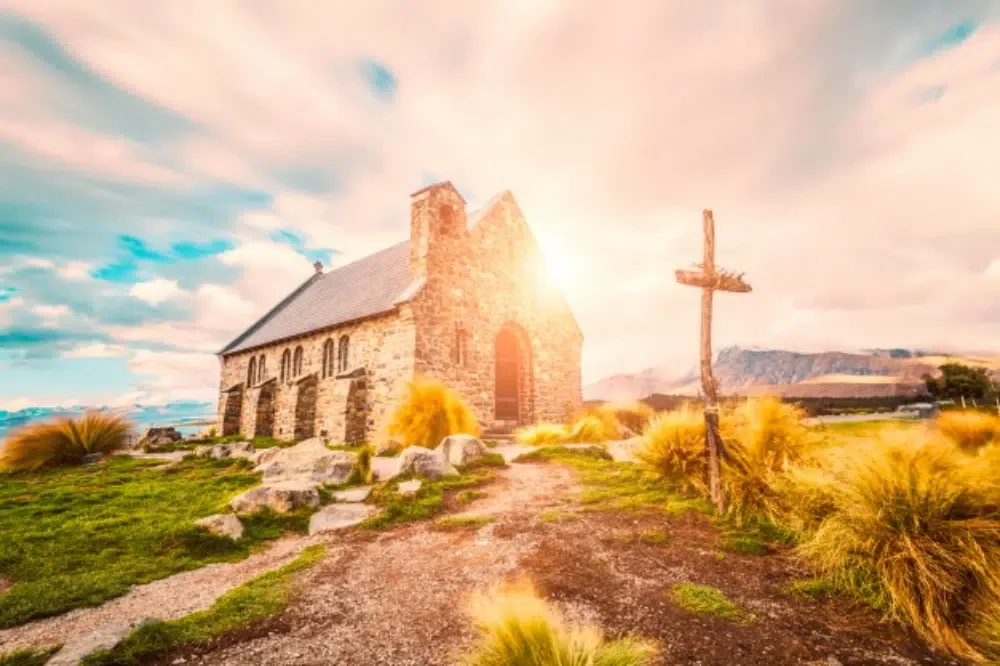The recent lawsuit against the Church of the Highlands has captured widespread attention, raising significant concerns about the integrity and governance of religious institutions. This case involves serious allegations against the church’s pastors and could set important precedents for how legal issues are handled within religious organizations. As the lawsuit unfolds, key aspects to explore include:
- Allegations and Legal Grounds: The specifics of the claims against the Church of the Highlands pastors and the legal basis for these accusations.
- Impact on the Congregation: How these allegations are affecting the church community and its operations.
- Broader Implications: The potential repercussions for other religious institutions and their governance practices.
This blog post will provide a comprehensive analysis of the Church of the Highlands lawsuit, examining its background, legal proceedings, and broader implications.
1. Background of the Church of the Highlands
History and Founding The Church of the Highlands, established in 2001, has grown into one of the largest and most influential churches in the U.S. Founded by Chris Hodges in Birmingham, Alabama, the church initially aimed to provide a welcoming and dynamic environment for worship. Over the years, it has expanded its reach with numerous campuses across multiple states, becoming a significant player in the evangelical community.
Leadership Structure The church’s leadership is structured with a senior pastor at the helm, supported by a team of executive pastors and campus leaders. This hierarchical structure is designed to manage the church’s extensive activities and outreach programs effectively. The pastors play a crucial role in setting the church’s vision, overseeing operations, and addressing congregational needs.
Public Image and Influence Known for its contemporary services and community-focused initiatives, the Church of the Highlands has cultivated a robust public image. It has a reputation for innovation in church services and extensive charitable work. Its influence extends beyond the local community, with a large online presence and a significant following that contributes to its widespread impact.
The Church of the Highlands’ rapid growth and extensive outreach have made it a prominent subject of interest, especially when legal issues arise. Understanding the church’s background provides essential context for the current lawsuit and its implications for both the church and the broader community.
2. Details of the Lawsuit
Parties Involved The lawsuit against the Church of the Highlands involves several key parties: the plaintiffs, who are former members or associates of the church, and the defendants, which include prominent pastors of the church. The plaintiffs allege serious misconduct, and the case has drawn attention due to the church’s high profile and the significant positions held by the accused pastors.
Allegations Against the Pastors The lawsuit centers on allegations of misconduct by the Church of the Highlands pastors. Specific claims include financial mismanagement, inappropriate behavior, and breach of fiduciary duty. These allegations suggest a pattern of misconduct that, if proven, could have severe legal and ethical implications for the church’s leadership and its overall governance.
Legal Grounds for the Lawsuit The legal claims in the lawsuit are grounded in several key areas:
- Financial Mismanagement: Accusations that the pastors misused church funds for personal gain or failed to account for financial transactions properly.
- Breach of Fiduciary Duty: Claims that the pastors did not act in the best interests of the church and its members, violating their legal and ethical responsibilities.
- Inappropriate Conduct: Allegations of behavior that is deemed unprofessional or unethical within the context of their roles as religious leaders.
These allegations form the basis of the legal proceedings, which aim to address the issues and determine the accountability of the church’s leadership. The outcome of the lawsuit could have significant consequences for the Church of the Highlands and set a precedent for how similar cases are handled in the future.
3. Legal Proceedings and Timeline
Filing of the Lawsuit The lawsuit against the Church of the Highlands was officially filed in early 2023, marking the beginning of a complex legal battle. The initial filing outlined the specific allegations against the pastors and sought legal remedies for the claims made by the plaintiffs. The case quickly gained attention due to the high profile of the defendants and the seriousness of the accusations.
Key Legal Developments Several key developments have occurred since the lawsuit’s initiation:
- Preliminary Hearings: The court conducted preliminary hearings to address procedural matters and determine the scope of the case.
- Discovery Phase: During this phase, both parties exchanged evidence and testimonies. This step was crucial for building the case and understanding the full extent of the allegations.
- Motions and Filings: Various motions have been filed, including requests for dismissal and challenges to evidence. These filings have shaped the trajectory of the case and impacted the legal strategies employed by both sides.
Current Status of the Case As of now, the lawsuit is in the midst of several ongoing legal battles. The court is reviewing evidence and preparing for a possible trial, where the allegations will be thoroughly examined. Both parties are engaged in negotiations and legal maneuvers, aiming to either reach a settlement or prepare for a courtroom showdown.
The legal proceedings in this case are pivotal in determining the outcome and holding the Church of the Highlands pastors accountable. The timeline of these events reflects the complexities of navigating legal challenges involving high-profile religious institutions and the significant impact such cases can have on all parties involved.
4. Impact on the Church Community
Reaction from Congregation Members The lawsuit has profoundly affected the congregation of the Church of the Highlands. Many members are grappling with shock and disappointment, as the allegations involve trusted leaders. There is a palpable sense of betrayal among some churchgoers, who now question the integrity of the church’s leadership and its values.
Changes in Church Operations In response to the lawsuit, the Church of the Highlands has made several operational adjustments. These include:
- Leadership Changes: Temporary changes in leadership roles to address the controversy and maintain church functions.
- Increased Transparency: Efforts to enhance financial transparency and governance practices to rebuild trust with the congregation.
- Community Outreach: Increased focus on community support and counseling for members affected by the allegations.
Community Response The broader community has also been impacted by the lawsuit. Local media coverage has heightened public awareness and scrutiny of the church’s practices. Community members and other religious institutions are observing closely, as the outcome of the case may influence how similar cases are handled in the future. The lawsuit has sparked discussions about accountability and ethical behavior within religious organizations, reflecting broader societal concerns about transparency and integrity.
The ramifications of the lawsuit extend beyond legal proceedings, affecting the Church of the Highlands’ community and operations. Understanding these impacts provides insight into the broader consequences of legal issues for religious institutions and their congregations.
5. Legal and Ethical Implications
Legal Consequences for the Pastors The potential legal outcomes for the Church of the Highlands pastors could be significant, depending on the findings of the case:
- Financial Penalties: If the court finds the pastors guilty of financial misconduct, they could face substantial fines or restitution orders.
- Criminal Charges: In severe cases, criminal charges could be brought if evidence of illegal activities, such as embezzlement or fraud, is established.
- Civil Liabilities: The pastors may be held liable for damages in a civil suit, which could include compensation for any harm caused to the plaintiffs.
Ethical Considerations The lawsuit raises important ethical questions:
- Trust and Integrity: The core issue is whether the pastors upheld the ethical standards expected of religious leaders. The case challenges the notion of trust that congregants place in their spiritual leaders.
- Accountability in Religious Institutions: This case highlights the need for strong accountability measures within religious organizations to prevent and address misconduct. It also prompts a reevaluation of how such institutions handle ethical breaches.
- Impact on Congregational Morale: The ethical breach has likely undermined the morale of the congregation, raising questions about how to restore faith and ensure ethical behavior in the future.
Impact on Church Governance The lawsuit could prompt significant changes in church governance:
- Revised Policies: The Church of the Highlands may implement stricter policies and procedures to enhance oversight and prevent future issues.
- Increased Transparency: Greater transparency in financial and operational matters could become a priority to rebuild trust and demonstrate accountability.
- Governance Reforms: The church might adopt reforms to improve leadership accountability and address any weaknesses exposed by the case.
The legal and ethical implications of this lawsuit are far-reaching, affecting not only the individuals involved but also the broader practices and policies of religious organizations. Addressing these implications is crucial for understanding the broader impact of the case on the Church of the Highlands and similar institutions.
6. Similar Cases and Precedents
Comparison with Other Lawsuits This case is not unique; several similar lawsuits have been filed against religious institutions over the years:
- High-Profile Cases: Other high-profile cases involving religious leaders and allegations of misconduct have drawn significant media attention and legal scrutiny. These cases often involve allegations of financial impropriety, sexual misconduct, or abuse of power.
- Legal Outcomes: The outcomes of these cases vary widely, from settlements and financial penalties to changes in church leadership and reforms in governance practices. Examining these precedents provides context for understanding potential outcomes in the Church of the Highlands case.
Precedents and Outcomes Relevant legal precedents can shed light on how this case might unfold:
- Legal Precedents: Previous rulings in similar cases can influence the handling of current legal claims. For instance, cases where churches have faced legal action for financial mismanagement or ethical breaches set important precedents for judicial decisions.
- Impact on Church Policy: Past cases have led to changes in church policies and practices. These outcomes often include stricter financial oversight, improved transparency, and enhanced accountability measures within religious institutions.
Lessons from Previous Cases Learning from previous legal battles involving religious organizations can provide valuable insights:
- Best Practices: Successful strategies in managing legal issues and maintaining transparency can offer guidance for the Church of the Highlands.
- Avoiding Pitfalls: Understanding common pitfalls and mistakes in similar cases can help in crafting effective responses and preventive measures.
The examination of similar cases and legal precedents highlights the broader context of the Church of the Highlands lawsuit, offering insights into potential outcomes and implications. Understanding these parallels helps in assessing the potential impact of the current case on the church and similar institutions.
7. Expert Opinions and Analysis
Legal Experts’ Insights Legal professionals provide critical analysis of the lawsuit’s potential outcomes and implications:
- Case Strength: Experts assess the strength of the plaintiffs’ case based on evidence and legal arguments. They evaluate whether the allegations of financial mismanagement and misconduct are likely to hold up in court.
- Legal Strategies: Insights into the legal strategies employed by both the plaintiffs and the defendants can shed light on the case’s trajectory. Experts may discuss the effectiveness of various legal tactics and potential strategies for resolution.
Religious Leaders’ Perspectives Religious leaders offer valuable perspectives on the ethical and organizational implications of the case:
- Ethical Standards: Leaders may discuss the ethical standards expected of religious institutions and the impact of such allegations on the broader faith community.
- Governance Reforms: Insights into how other religious organizations have addressed similar issues can provide guidance on potential governance reforms and best practices.
Public Reactions and Media Coverage The media’s portrayal of the case and public reactions contribute to the overall understanding of its significance:
- Media Coverage: Analysis of media coverage can reveal how the lawsuit is being portrayed and its impact on public perception. The way the media reports on the case can influence public opinion and contribute to the narrative surrounding the allegations.
- Community Responses: Public reactions, including social media discussions and community responses, provide additional context. Understanding how the broader community views the case can offer insights into its societal impact.
Expert opinions and analysis offer a deeper understanding of the lawsuit’s potential outcomes and broader implications. By examining legal, religious, and public perspectives, we gain a comprehensive view of how the case affects various stakeholders and what it might mean for the Church of the Highlands and similar organizations.
8. Future Outlook
Potential Resolutions The lawsuit against the Church of the Highlands could conclude in several ways, depending on the case’s progression:
- Settlement: A settlement could be reached if both parties agree on terms outside of court. This option might involve financial compensation, changes in church practices, or other concessions.
- Trial Verdict: If the case goes to trial, a verdict will determine the outcome based on the evidence presented. The court’s decision will establish legal accountability and potentially set a precedent for similar cases.
- Dismissal: The case could be dismissed if the court finds insufficient evidence or legal grounds for the claims. This outcome would mean that the allegations are not upheld, but it may not fully address the issues raised.
Long-Term Implications The outcome of the lawsuit will have lasting effects on the Church of the Highlands and the broader religious community:
- Impact on Church Practices: The church may implement changes in governance and financial oversight to prevent future issues. These changes could include stricter accountability measures and enhanced transparency.
- Precedents for Other Institutions: The case may set legal and ethical precedents for how similar allegations are handled in other religious organizations. This could lead to increased scrutiny and reforms across the sector.
- Community Trust: The resolution of the case will influence how trust is restored within the congregation and the broader community. Effective management of the situation will be crucial for rebuilding confidence and maintaining the church’s reputation.
Ongoing Developments As the lawsuit progresses, staying informed about key developments will be essential:
- Legal Updates: Following updates on legal proceedings and any changes in the case’s status will provide insights into its resolution.
- Church Responses: Monitoring the Church of the Highlands’ responses and actions in light of the lawsuit will reveal how it is addressing the issues and adapting to the situation.
The future outlook of the lawsuit involves various potential resolutions and long-term implications for the Church of the Highlands and similar institutions. Understanding these aspects will provide a comprehensive view of how the case may evolve and its broader impact on religious organizations and their communities.
9. Broader Impact on Religious Institutions
Increased Scrutiny on Religious Leaders The lawsuit against the Church of the Highlands highlights a growing trend of scrutiny on religious leaders:
- Transparency Demands: There is an increasing demand for transparency in how religious institutions manage finances and handle allegations of misconduct. This trend reflects broader societal expectations for accountability.
- Ethical Standards: Religious leaders are facing heightened expectations to adhere to strict ethical standards. The case underscores the need for religious institutions to implement robust measures to prevent and address unethical behavior.
Governance Reforms in Religious Organizations The Church of the Highlands case may prompt reforms in governance practices across religious institutions:
- Stronger Oversight: Other religious organizations might adopt stronger oversight mechanisms to ensure proper management and prevent misconduct. This could include regular audits and independent review processes.
- Clear Policies and Procedures: Developing clear policies and procedures for handling allegations and financial management can help institutions navigate potential issues more effectively.
- Training and Education: Implementing training programs for leaders and staff on ethical behavior and compliance can contribute to better governance and prevent similar issues.
Impact on Congregational Trust The case’s outcome and the broader response to it will significantly affect trust within congregations:
- Restoring Confidence: How the Church of the Highlands and similar institutions address and resolve such issues will play a crucial role in restoring confidence among their members. Transparency, accountability, and genuine efforts to rectify problems are key to rebuilding trust.
- Influence on Congregational Participation: Ongoing legal issues and scandals can influence congregation participation and overall church attendance. Members may become more cautious about their involvement or shift their support to other organizations.
Sector-Wide Implications The lawsuit’s impact extends beyond individual institutions, affecting the entire religious sector:
- Public Perception: High-profile cases can shape public perception of religious institutions, influencing how they are viewed and trusted by the broader community.
- Legal Precedents: The case may establish legal precedents that affect how future lawsuits involving religious organizations are handled, potentially leading to more rigorous legal standards and expectations.
The broader impact of the Church of the Highlands lawsuit underscores significant changes and challenges facing religious institutions. Increased scrutiny, governance reforms, and shifting trust dynamics are all part of the evolving landscape for religious organizations dealing with legal and ethical issues.
10. Conclusion
The lawsuit against the Church of the Highlands has brought to light crucial issues surrounding the governance and ethical conduct of religious institutions. With allegations of misconduct against its pastors, the case not only challenges the integrity of the church’s leadership but also sets a precedent for how similar situations may be handled in the future.
Key Takeaways
- Legal Implications: The legal proceedings will determine the accountability of the pastors and could have significant consequences for both the individuals involved and the Church of the Highlands. The case highlights the need for rigorous legal and ethical standards within religious organizations.
- Impact on the Church Community: The lawsuit has deeply affected the church’s congregation, influencing trust and operations. The church’s response to the allegations and any subsequent changes will be crucial in rebuilding confidence and maintaining its community ties.
- Broader Effects: The outcome of this case will likely influence how other religious institutions manage ethical and legal challenges. It could lead to increased scrutiny, governance reforms, and a re-evaluation of practices within the sector.
Looking Ahead As the lawsuit continues to unfold, it is important to remain informed about its developments and their implications. The case serves as a reminder of the importance of transparency, accountability, and ethical behavior in all organizations, particularly those in positions of significant influence and trust.
By understanding the complexities of this lawsuit and its broader impact, stakeholders can better navigate the challenges and opportunities it presents. The Church of the Highlands case offers valuable lessons for religious institutions and provides a critical lens through which to examine issues of leadership and integrity within the faith community.

Nicholas Clark brings a dynamic blend of insight and enthusiasm to SpoortsUp.com. With a keen eye for detail and a passion for sports analysis, Nicholas delivers engaging and thought-provoking content. Whether it’s breaking down game strategies or highlighting athlete achievements, his articles keep readers coming back for more.











